The Suffering Church Worldwide - Africa
The Church is growing in Africa, but it still faces many serious challenges, including poverty, famine, AIDS, war, ethnic conflicts and Islamic extremism.
Christian or Mixed Countries
Angola, a formally Marxist country on the west coast of Africa, used to engage in anti-religious persecution but now has a large Catholic population that makes up 43% of its population, the rest being divided between Protestant denominations (12%) and indigenous beliefs (45%). The country is officially committed to religious liberty and the separation of Church and State, and individual denominations are allowed in relation to their compatibility with public order and national interests. In 1995 a decree was issued forbidding all religious practice not recognized by the State, but the decree has not been widely enforced. The Church suffered under the 27 year civil war that only ended in 2002. The war destroyed the country’s infrastructure, including hospitals and schools, and left tens of thousands of children handicapped, mutilated, or orphaned. Many children were also used as child soldiers and many women were forced into sexual slavery. Angola still suffers from great poverty, with 75% of the population living on less than $1 a day, and it has one of the highest infant mortality rates in the world. Malnutrition and lack of educational opportunities remain serious problems.
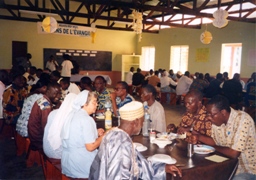 Bordering Nigeria, Benin is a mixed country which is 42.8% Christian (Catholic 27.1%, Celestial 5%, Methodist 3.2%, other Protestant 2.2%, other 5.3%), 24.4% Muslim, 17.3% Vodoun, and 15.5% other. One of the poorest countries in the world, Benin is marked by a very low standard of living, high unemployment and government corruption, all of which impede social and economic progress. The Church suffered persecution under the Marxist dictatorship which reigned from 1972 to 1990, and it is now threatened by the rise of Islam, competing Christian sects, and religious syncretism. Bordering Nigeria, Benin is a mixed country which is 42.8% Christian (Catholic 27.1%, Celestial 5%, Methodist 3.2%, other Protestant 2.2%, other 5.3%), 24.4% Muslim, 17.3% Vodoun, and 15.5% other. One of the poorest countries in the world, Benin is marked by a very low standard of living, high unemployment and government corruption, all of which impede social and economic progress. The Church suffered persecution under the Marxist dictatorship which reigned from 1972 to 1990, and it is now threatened by the rise of Islam, competing Christian sects, and religious syncretism.
Burundi lies between Rwanda, Tanzania, and the Democratic Republic of the Congo and has a Catholic majority of 62%, while the rest of the population is divided between Protestant denominations (5%), Islam (10%), and indigenous beliefs (23%). There is no specific legislation regarding religion and no open discrimination, but years of civil war between Hutus and Tutsis have led to insecurity, attacks, and poor economic conditions.
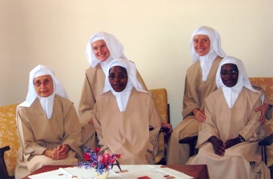 Next to both Nigeria and the Central African Republic, Cameroon has a mixed population, partly Christian (40%), partly indigenous beliefs (40%), and partly Muslim (20%). Religious freedom is guaranteed, as is the separation of Church and State, but all religious confessions must be registered with the government. The country has not suffered from war and famine to same degree as other African countries, but it still faces poverty, corruption, AIDS and the growth of Islam, which is the majority religion in three of the ten provinces in Cameroon. Next to both Nigeria and the Central African Republic, Cameroon has a mixed population, partly Christian (40%), partly indigenous beliefs (40%), and partly Muslim (20%). Religious freedom is guaranteed, as is the separation of Church and State, but all religious confessions must be registered with the government. The country has not suffered from war and famine to same degree as other African countries, but it still faces poverty, corruption, AIDS and the growth of Islam, which is the majority religion in three of the ten provinces in Cameroon.
The Central African Republic, which borders Sudan, Chad, and the Democratic Republic of the Congo, is marked by anarchy, poverty, AIDS, armed conflict, political instability, insecurity, abandoned villages, criminality, dangerous roads, and the rise of Islam. Theoretically, the country has a Christian majority (50%: 25% Catholic and 25% Protestant), but many nominal Christians are strongly influenced by animist beliefs and practices (followers of which make up 35% of the population, with Islam making up another 15%). Villages are sometimes burned and inhabitants brutalized by police accusing the villagers of collaborating with rebels.
Cote D’Ivoire (Ivory Coast) is a mixed West African state between Ghana and Liberia which is 35-40% Muslim, 25-40% indigenous, and 20-30% Christian, although a large percentage of foreign workers are Muslim (70%) or Christian (20%). Civil war has divided the country, with rebel groups controlling the north and government forces maintaining control in the south. Although accords have been passed and a cease-fire exists, the resulting peace is fragile. Poised on the brink of catastrophe, the economic, social, humanitarian and security situation in Cote D’Ivoire has deteriorated and almost half of the population lives on less than $1 a day. The Church is challenged as well by local African traditions which engage in sorcery and fetishism.
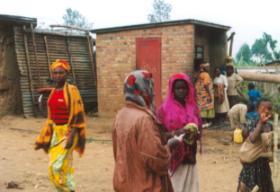 Bordering a number of African countries (including Sudan, Rwanda, and Angola), the Democratic Republic of the Congo or DRC, was formerly a Belgian colony established in 1908. Today Catholics are 50% of the population and other Christian denominations make up 30% of the remaining population, with the rest divided between Islam (10%) and indigenous beliefs or syncretic sects (10%). The government guarantees religious freedom, although religious groups are subject to government control. Under the dictatorship of President Mobutu, the government had the right to authorize or forbid all religious communities. Churches are sometimes robbed by underpaid soldiers. The country has suffered years (1996-2003) of civil war and foreign invasions, which have led to extreme violence; the internal conflicts have not yet subsided. Despite possessing many natural resources, the DRC is one of the poorest countries in the world, and thousands have died due to violence, hunger and disease. Millions of children do not receive a proper education, and many live in poor conditions and have been used as slaves, raped or turned into child-soldiers. Bordering a number of African countries (including Sudan, Rwanda, and Angola), the Democratic Republic of the Congo or DRC, was formerly a Belgian colony established in 1908. Today Catholics are 50% of the population and other Christian denominations make up 30% of the remaining population, with the rest divided between Islam (10%) and indigenous beliefs or syncretic sects (10%). The government guarantees religious freedom, although religious groups are subject to government control. Under the dictatorship of President Mobutu, the government had the right to authorize or forbid all religious communities. Churches are sometimes robbed by underpaid soldiers. The country has suffered years (1996-2003) of civil war and foreign invasions, which have led to extreme violence; the internal conflicts have not yet subsided. Despite possessing many natural resources, the DRC is one of the poorest countries in the world, and thousands have died due to violence, hunger and disease. Millions of children do not receive a proper education, and many live in poor conditions and have been used as slaves, raped or turned into child-soldiers.
With just over 600,000 people, Equatorial Guinea is a small country on the west coast of Africa that is above Gabon and below Cameroon. It is almost entirely Catholic (99%), at least nominally, although many engage in pagan practices as well. While wealth is generated through oil revenue for a small number, most continue to suffer from poverty, corruption and human rights violations.
Eritrea, a country on the east coast of Africa which borders Ethiopia and Sudan, has a mix of Muslims (46%), Coptic Orthodox (42.6%) and Catholics (2.6%), although there are Protestant Christians as well. The provisional legislation of this new state guarantees religious freedom but limits religious activity and forbids churches from interfering in the political realm. In fact, the Marxism-inspired regime severely oppresses Christians and is one of the most repressive in Africa. Churches not authorized by the government are closed. Independence for Eritrea was only won in 1993 after 30 years of war in which 20% of the population was displaced. Further outbreaks of fighting in 1998 and 2000 have left between 80 and 100,000 dead, and the country’s economy, as well as its agricultural and educational systems, has been devastated. Malnutrition claims the lives of 60% of children before the age of 5. In the past few years, Christians have been singled out for arrest, forced labor, imprisonment, and torture, and Bibles have also been confiscated and burned.
Lying between Sudan and Somalia, Ethiopia is unique in Africa as a majority Orthodox country (50.6%), although there are also Protestants (10.2%), followers of traditional African religions (4.6%) and a significant number of Muslims (32.8%). Catholics make up only 1% of the population. Religious freedom exists both in theory and practice, but the government does impose certain limits and demands that all religious confessions be registered in order to have legal status. In 2006, a Christian who had recently converted from Islam was beaten and crucified. The attack occurred in a majority-Muslim region close to Sudan in which incidents of persecution and attacks against Christians have been multiplying and intensifying. Homes have also been ransacked and burned and Christians have been forced from their lands. Poverty, famine, internal conflict over resources, pressure from evangelical sects and environmental problems (deforestation, lack of water, pollution) also pose problems for the small Catholic presence.
Gabon, on the west coast of Africa near Cameroon and the Republic of the Congo, is a majority Christian country (55-75%, of which 54% are Catholic) with a significant number of animists (up to 30%) and a small number of Muslims (less than 1%). Freedom of religion is guaranteed, but public order must be respected. Here the country is relatively stable and peaceful, but the Church is confronted with the grown of evangelical sects which work to convert Catholics to their churches. President Bongo, a convert to Islam, has been in power for almost 40 years, and was re-elected in 2005 amidst accusations of massive fraud. Government corruption limits economic growth, and 62% of the population live below the poverty line.
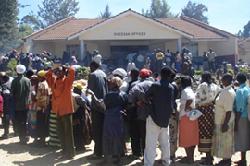 Christians are the majority in Kenya, a country on the east coast of Africa which borders Sudan, Ethiopia, and Somalia. The population is 45% Protestant, 33% Roman Catholic, 10% Muslim, and 10% indigenous beliefs or other. Religious freedom is guaranteed by the Constitution, as is the right to propagate one’s faith, but all new religious movements must be registered with the government. In 2006, however, 1 person was killed and 3 others were wounded in an attack against a Christian radio station. The attack followed a broadcast encouraging Muslims to convert to Christianity. Political conflicts over 2007 election results have led to ethnic violence, the killing of 1,000 people and more than 500,000 fleeing their homes. Poor conditions in refugee camps, in which many women are raped, also leads to the spread AIDS. In 2008, 35 people, including women and children, were killed after the church in which they were worshipping was set on fire. Some were killed with machetes when they attempted to flee the blaze. Christians are the majority in Kenya, a country on the east coast of Africa which borders Sudan, Ethiopia, and Somalia. The population is 45% Protestant, 33% Roman Catholic, 10% Muslim, and 10% indigenous beliefs or other. Religious freedom is guaranteed by the Constitution, as is the right to propagate one’s faith, but all new religious movements must be registered with the government. In 2006, however, 1 person was killed and 3 others were wounded in an attack against a Christian radio station. The attack followed a broadcast encouraging Muslims to convert to Christianity. Political conflicts over 2007 election results have led to ethnic violence, the killing of 1,000 people and more than 500,000 fleeing their homes. Poor conditions in refugee camps, in which many women are raped, also leads to the spread AIDS. In 2008, 35 people, including women and children, were killed after the church in which they were worshipping was set on fire. Some were killed with machetes when they attempted to flee the blaze.
Next to Cote D’Ivoire and Sierra Leone on the west coast of Africa, Liberia is more or less evenly divided between indigenous believers (40%) and Christians (40%), although there are also many Muslims (20%). Here the Church suffered through 20 years of civil war and ethnic conflict which began in 1980 after a military coup. The effects of the war still linger, including a legacy of child soldiers and continuing tension.
Almost 80% (79.9%) of the population of Malawi are Christian, of which almost 11% (10.9%) are Catholic, while the remaining population is a mixture of Islam (12.8%) and indigenous beliefs. Religious liberty is guaranteed by the Constitution of Malawi, which lies between Zambia, Tanzania, and Mozambique, but incidents against Christians have risen since 1997.
 Catholics are 23.8% of the population of Mozambique, a country on the east coast of Africa which borders, Zambia, Zimbabwe, and South Africa. Mozambique also has a significant number of Zionist Christians (17.5%) and Muslims (17.8%). Religious freedom is guaranteed by the Constitution, but the Church had suffered greatly during the Marxist dictatorship and civil war that lasted from 1977 to 1992 and which left tens of thousands dead and turned thousands more into refugees. Anti-personal mines also remain in the soil as a result of the conflict. Famine and corruption remain serious problems. In 2006, two missionaries, a Jesuit volunteer from Portugal and a Brazilian priest, were killed and two other Jesuits were wounded. Catholics are 23.8% of the population of Mozambique, a country on the east coast of Africa which borders, Zambia, Zimbabwe, and South Africa. Mozambique also has a significant number of Zionist Christians (17.5%) and Muslims (17.8%). Religious freedom is guaranteed by the Constitution, but the Church had suffered greatly during the Marxist dictatorship and civil war that lasted from 1977 to 1992 and which left tens of thousands dead and turned thousands more into refugees. Anti-personal mines also remain in the soil as a result of the conflict. Famine and corruption remain serious problems. In 2006, two missionaries, a Jesuit volunteer from Portugal and a Brazilian priest, were killed and two other Jesuits were wounded.
Upon independence in 1960, the former French region of Middle Congo became the Republic of the Congo. Now the country, which lies between Gabon and the Democratic Republic of the Congo, is 50% Christian (of Catholics are the substantial majority), 48% animist, and 2% Muslim. Religious liberty is guaranteed and there is an official separation of Church and State. The law explicitly forbids the use of religion for political gain. The Church does suffer from the violence affecting the country. After abandoning Marxism in the 1990s, the country was prey to civil war, and a relative peace was only achieved in 2003. The country is rich in natural resources, particularly oil, but its growth is hampered by corruption, and 70% of the population lives on less than $1 a day. Many children are used as slaves, and there is much discrimination and racism directed toward the Pygmies. The Catholic presence is also threatened by the growth of evangelical sects.
Catholics are the majority in Rwanda, which borders Uganda, Tanzania, and the Democratic Republic of Congo. The Church makes up 56.6% of the population, while another 37.1% are Protestant and 4.6% are Muslim. While there is no official discrimination of the Church, the government attempts to limit the Church’s influence and encourages hostile actions against it. The country is still recovering from the 1994 genocide of the Tutsi minority by the Hutu majority in which 800,000 people were killed and in which 2 million were forced to flee to neighboring countries as refugees.
There are many Christians in South Africa from a variety of denominations, including Anglicans (4%), Pentecostals/Charismatics (8.2%), Methodist (6.8%) and Dutch Reform (6.7%), among others Christian denominations (36%) and other religious confessions. Catholics make up 7.1% of the population, and religious freedom is guaranteed by the Constitution, which affirms in its preamble the need to uphold “Christian values” and “civilized norms.” While there are only a small number of Muslims (1.5%), attacks by Muslim militants have increased since 1998. Two Catholic missionaries have been murdered in their homes by robbers, one in 2003 and one in 2004.
Bordering Kenya, Uganda, Rwanda, Burundi, the Democratic Republic of the Congo, Zambia, and Mozambique, Tanzania is 30% Christian, 35% Muslim, and 35% indigenous beliefs. Religious liberty is guaranteed by the Constitution, but discrimination against Christians does occur in Zanzibar, where 99% of the local population is Muslim.
South of Sudan and north of Rwanda, Uganda is over 80% Christian (41.9% Catholic, 42% Protestant). Muslims (12.1%) and others (4%) make up the rest of the population. The Constitution guarantees religious liberty and does not favor any particular denomination, but the government struggles with religious/political dissident groups. Civil war has been waged for over 20 years, leaving 1 million refugees, many massacres and assassinations, and tens of thousands of child-soldiers. Women are also kidnapped to be used as sex slaves, conditions in refugee camps are poor, and corruption limits the efficacy of international aid.
Statistics are conflicted about Zambia, a country above Zimbabwe and below the Democratic Republic of the Congo which is 50-75% Christian, the rest being divided between indigenous religious practitioners, Muslims, and Hindus. An estimated 50% of the Christians are Catholic. Religious liberty is guaranteed by the Constitution, but a 1996 amendment also declared Zambia to be a Christian nation. Poverty, unemployment and corruption are significant issues. AIDS affects 20% of the population, but tuberculosis and malaria also cause great suffering. It is expected that Zambia’s orphan population will rise to 1 million, or 10% of the population, in the years ahead.
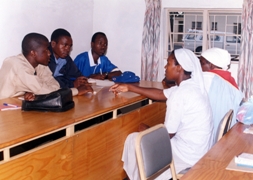 Just north of South Africa, Zimbabwe has a population which is 25% Christian, of who 8% are Catholic. Another 24% follow indigenous beliefs, while the majority, 50%, practices both Christianity and traditional beliefs. Muslims make up less than 1% of the population. The Constitution guarantees religious liberty, but the government does impose certain limits, and President Mugabe, the last Marxist dictator in Africa, has made hostile statements against the various Christian churches since 1998, in particular the Catholic Church. Catholics are sometimes arrested and are subject to violence, intimidation by state police and government interference in their religious gatherings. The Church has also suffered due to the current financial and political crisis, the worst in Zimbabwe’s history, which has included acts of violence and torture, soaring inflation and food prices, widespread unemployment, a destroyed agricultural system and the threat of famine. Just north of South Africa, Zimbabwe has a population which is 25% Christian, of who 8% are Catholic. Another 24% follow indigenous beliefs, while the majority, 50%, practices both Christianity and traditional beliefs. Muslims make up less than 1% of the population. The Constitution guarantees religious liberty, but the government does impose certain limits, and President Mugabe, the last Marxist dictator in Africa, has made hostile statements against the various Christian churches since 1998, in particular the Catholic Church. Catholics are sometimes arrested and are subject to violence, intimidation by state police and government interference in their religious gatherings. The Church has also suffered due to the current financial and political crisis, the worst in Zimbabwe’s history, which has included acts of violence and torture, soaring inflation and food prices, widespread unemployment, a destroyed agricultural system and the threat of famine.
Muslim Countries
Bordering Sudan, Nigeria, and Libya, Chad has a majority Muslim population (53.1%), a significant number of Christians (20.1% Catholic, 14.2% Protestant) and smaller number of animists (7.3%) and others (5.3%). The government guarantees religious liberty, which does exist in most areas of Chad apart from harassment by local Muslims. One of the poorest countries in the world, Chad has suffered from years of warfare, and the average life expectancy is only 50. Rebellions and violent attacks continue in various regions, notably in the east and south, as well as incidents of intimidation and aggression. One religious missionary was killed and two others were wounded in 2004 while traveling in an attack by bandits.
Comoros, in Southern Africa, consists of a group of islands situated between northern Madagascar and northern Mozambique. The country has endured more than 20 coups or attempted coups since gaining independence from France in 1975. Some 730,000 people live there, 98% of who are Sunni Muslim. Catholics make up 2% of the population. Religious discrimination is forbidden by law, but all legislation and government activities are based on Islam and only Islam can be practiced publicly. All proselytism is forbidden. In 2006, four Christians caught practicing their faith were subjected to beatings and imprisonment. The president has also stated his willingness to impose Sharia law if his people demand it.
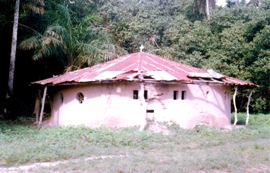 Islam is dominant in Guinea, a country on the west coast of Africa, near Sierra Leone, where Muslims make up 85% of the population and where only 8% are Christian and another 7% practice indigenous beliefs. Religious liberty is guaranteed and there is no state religion, although all religious groups must be registered with the government. Catholic missionaries were thrown out of the country in 1996 after being accused of preaching on political themes. Violence and vandalism against Christians does occur, especially in the south of the country, and over 20 people were hurt, many seriously, in a 2005 confrontation between Muslims and Christians. In 2004, a violent confrontation left dozens of both communities dead after an imam was struck by someone riding a bicycle without brakes. Prior to 1984, Guinea had been governed by a Marxist dictator. The country continues to be plagued by human rights violations, corruption, ethnic rivalries, poverty, economic crises and political instability. The proliferation of new religious sects also poses a threat to the Church in Guinea. Islam is dominant in Guinea, a country on the west coast of Africa, near Sierra Leone, where Muslims make up 85% of the population and where only 8% are Christian and another 7% practice indigenous beliefs. Religious liberty is guaranteed and there is no state religion, although all religious groups must be registered with the government. Catholic missionaries were thrown out of the country in 1996 after being accused of preaching on political themes. Violence and vandalism against Christians does occur, especially in the south of the country, and over 20 people were hurt, many seriously, in a 2005 confrontation between Muslims and Christians. In 2004, a violent confrontation left dozens of both communities dead after an imam was struck by someone riding a bicycle without brakes. Prior to 1984, Guinea had been governed by a Marxist dictator. The country continues to be plagued by human rights violations, corruption, ethnic rivalries, poverty, economic crises and political instability. The proliferation of new religious sects also poses a threat to the Church in Guinea.
Bordering Algeria, Mauritania, and Niger, Mali is a predominantly Muslim country (90%) with only a small number of Christians (1%) and a minority of practitioners of indigenous beliefs (9%). Here the Church is a small but appreciated and respected presence in a relatively stable country. While Mali is one of the poorest countries in the world, its economy shows signs of improvement, but desertification remains a problem.
Mauritania, on the northwest coast of Africa near the Western Sahara, is an almost entirely Muslim country (99.5 100%). Since 1991, it has been an Islamic republic where Islam is the state religion and all proselytism by other religions or conversions to other religions is forbidden. The government does not allow and actively prosecutes any displays of Christianity.
Like its neighbor, Mauritania, Morocco is an almost entirely Muslim country (98.7%), although there is a small Christian (1.1%) and Jewish (0.2%) presence. Islam is the state religion, but Christians and Jews are allowed to practice their religions. Proselytism by other religions and conversion from Islam are strictly forbidden. Moroccans of Muslim origin who convert to Christianity are severely persecuted. In 1994, a Moroccan citizen who received Christian literature by mail was arrested and condemned for being a Christian. Others have been arrested for proselytism.
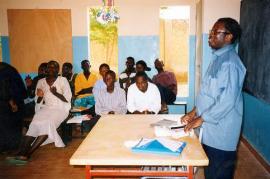 Islam is the religion of the great majority of the people in Niger (80%), which lies between Algeria, Libya, and Nigeria, while the rest of the population is divided between animists and Christians, with Catholics numbering only some 25,000. The Constitution guarantees religious liberty, and Niger is one of the few Muslim-majority countries in the world that permits conversions to other religions and in which freedom of religion is a practical reality. Millions of Nigeriens suffer from famine due to dry conditions and cricket invasions and the extreme poverty that has been the result. Malnutrition affects 40% of children, and slavery is still a reality in Niger, with 43,000 slaves existing in the country and another 800,000 living in slave-like conditions. Islam is the religion of the great majority of the people in Niger (80%), which lies between Algeria, Libya, and Nigeria, while the rest of the population is divided between animists and Christians, with Catholics numbering only some 25,000. The Constitution guarantees religious liberty, and Niger is one of the few Muslim-majority countries in the world that permits conversions to other religions and in which freedom of religion is a practical reality. Millions of Nigeriens suffer from famine due to dry conditions and cricket invasions and the extreme poverty that has been the result. Malnutrition affects 40% of children, and slavery is still a reality in Niger, with 43,000 slaves existing in the country and another 800,000 living in slave-like conditions.
Nigeria, which borders Benin and Cameroon in Western Africa, has a population of close to 140 million, of which 50% are Muslim, 40% are Christian, and 10% follow indigenous beliefs. Religious freedom is guaranteed by the 1989 Constitution, although it is currently suspended. Church activities are controlled by the government, and there are restrictions regarding the entry of foreign missionaries. Marked by poverty, 71% of Nigerians live on less than $1 a day, the infant mortality rate is high, and the development of the agricultural sector has been neglected for decades. The religious education of children is allowed, but members of religious communities are not allowed to enter primary schools. Catholic schools which refused to include formation in Islam in their curriculum were closed. In 1999 and 2000, five states in Nigeria implemented Sharia law. The Church is persecuted, especially in the North, and in the past 8 years, 50,000 Christians have been killed, while tens of thousands more have been forced to flee their homes. In a 2006 incident, young Muslims attacked Christian edifices in the north after claiming that a young woman had insulted the Prophet. As a result, ten churches and forty Christian-owned stores were burned.
Senegal’s over 12,850,000 people are predominantly Muslim (94%), although there is a number of Christians (5%, mostly Catholic) and indigenous believers (1%) in this country on the west coast of Africa. While a minority, the Church is free to engage in missionary activity and is mostly respected by the Muslim majority. Aside from fishing and agricultural, the country is lacking in natural resources and suffers from draught. Senegal’s poverty also causes many to emigrate. There have been cases of police intrusion into churches.
Sierra Leone, on the coast of West Africa near Liberia and Guinea, has a Muslim majority of 60%, although there are a significant number of practitioners of indigenous beliefs (30%) and a smaller number of Christians (10%). While religious liberty is technically guaranteed, during the savage 11 year civil war the Church was subject to attack. The war, instigated by Charles Taylor, left almost 200,000 dead and was marked by the use of child soldiers
Somalia, an almost entirely (99.5%) Sunni Muslim country on the east coast of Africa, has suffered for years from institutional chaos and violent conflict. Since the ousting of President Barre in 1991, Somalia has descended into anarchy, with over 500,000 killed due to factional and tribal conflicts and another 2 million forced to flee as refugees. The country is a humanitarian disaster with the worst health indicators in the world: more than 1 of every 10 children does not survive childbirth, and a quarter of those who do survive die before the age of 5. A transitional government backed by the Ethiopian military is in place, but militant factions still control much of the country. There is a tiny Catholic presence of 2,000 people, but during the war the Cathedral in Mogadishu was destroyed and members of religious orders were forced to flee. As a result, Catholic activity has almost ceased in Somalia. One religious Sister was killed in 2006 by Islamists who claimed the attack was motivated by the Pope Benedict’s September 12th remarks about Islam at Regensburg. Islamists continue to try to radicalize Somali society, with one leader in 2006 demanding that all non-practicing Muslims be killed.
 On the edge of the Middle East near Libya, Egypt, and Saudi Arabia, Sudan is religiously divided between a Sunni Muslim north (70%) and a Christian south (5%, especially in Khartoum), with a significant amount of practitioners of indigenous beliefs (25%). Politically, the country is ruled by an Islamic dictatorship, a military government which proclaims religious liberty but in which Islam is the state religion and in which Sharia law is imposed. The Catholic Church is the only religious confession other than Islam allowed in Sudan, but the Church’s activities are limited. For over 20 years, Catholics and animists in Sudan’s south have suffered massacres resulting in over 2.5 million deaths and the rape of many women and young girls. Peace accords were only reached in 2005, but the peace is extremely fragile, and conflict is likely to break out again. In the region of Darfur alone, 200,000 have been killed in what amounts to ethnic cleansing, and 2.5 million refugees have fled to neighboring Chad since 2003. Poverty in Sudan is a serious problem, and children who are not enrolled in Catholic schools either do not receive an education or are enrolled in Muslim schools. On the edge of the Middle East near Libya, Egypt, and Saudi Arabia, Sudan is religiously divided between a Sunni Muslim north (70%) and a Christian south (5%, especially in Khartoum), with a significant amount of practitioners of indigenous beliefs (25%). Politically, the country is ruled by an Islamic dictatorship, a military government which proclaims religious liberty but in which Islam is the state religion and in which Sharia law is imposed. The Catholic Church is the only religious confession other than Islam allowed in Sudan, but the Church’s activities are limited. For over 20 years, Catholics and animists in Sudan’s south have suffered massacres resulting in over 2.5 million deaths and the rape of many women and young girls. Peace accords were only reached in 2005, but the peace is extremely fragile, and conflict is likely to break out again. In the region of Darfur alone, 200,000 have been killed in what amounts to ethnic cleansing, and 2.5 million refugees have fled to neighboring Chad since 2003. Poverty in Sudan is a serious problem, and children who are not enrolled in Catholic schools either do not receive an education or are enrolled in Muslim schools.
Countries Practicing Indigenous Beliefs
Guinea-Bissau, on the eastern coast of Africa just south of Senegal, has just over 1.5 million people, 50% of who practice indigenous beliefs, 45% of who are Muslim and 5% of who are Christian. Religious liberty is guaranteed, but a state of civil war has led to a number of restrictions. Constitution chaos, social disorder, electoral fraud, human rights violations, alcoholism, divorce, polygamy, AIDS, unemployment, lack of educational opportunities and tensions between the government and the military help keep Guinea-Bissau one of the poorest countries in the world.
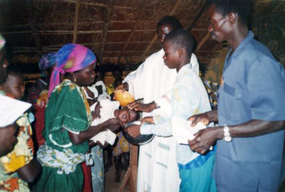 A small country in between Ghana and Benin in Western Africa, Togo is one of the few countries in Africa where a majority (51%) still practice indigenous beliefs, although there are significant numbers of Christians (29%, of whom 26% are Catholic) and Muslims (20%). Religious liberty is guaranteed and real in Togo. A political crisis initiated by the ascension to power of Faure Gnassingbé after the 2005 death of his father, the General Gnassingbé Evadéma, remains unresolved. The crisis has been marked by irregularities in the election process, intimidation of rivals, and the fleeing of 17,000 refugees into neighboring countries. A small country in between Ghana and Benin in Western Africa, Togo is one of the few countries in Africa where a majority (51%) still practice indigenous beliefs, although there are significant numbers of Christians (29%, of whom 26% are Catholic) and Muslims (20%). Religious liberty is guaranteed and real in Togo. A political crisis initiated by the ascension to power of Faure Gnassingbé after the 2005 death of his father, the General Gnassingbé Evadéma, remains unresolved. The crisis has been marked by irregularities in the election process, intimidation of rivals, and the fleeing of 17,000 refugees into neighboring countries.
Primary source for population and religion estimates: http://www.cia.gov/
Return to The Suffering Church Worldwide
|

 Bordering Nigeria, Benin is a mixed country which is 42.8% Christian (Catholic 27.1%, Celestial 5%, Methodist 3.2%, other Protestant 2.2%, other 5.3%), 24.4% Muslim, 17.3% Vodoun, and 15.5% other. One of the poorest countries in the world,
Bordering Nigeria, Benin is a mixed country which is 42.8% Christian (Catholic 27.1%, Celestial 5%, Methodist 3.2%, other Protestant 2.2%, other 5.3%), 24.4% Muslim, 17.3% Vodoun, and 15.5% other. One of the poorest countries in the world,  Next to both
Next to both  Bordering a number of African countries (including
Bordering a number of African countries (including  Christians are the majority in
Christians are the majority in  Catholics are 23.8% of the population of
Catholics are 23.8% of the population of  Just north of
Just north of  Islam is dominant in
Islam is dominant in  Islam is the religion of the great majority of the people in
Islam is the religion of the great majority of the people in  On the edge of the Middle East near Libya, Egypt, and Saudi Arabia, Sudan is religiously divided between a Sunni Muslim north (70%) and a Christian south (5%, especially in Khartoum), with a significant amount of practitioners of indigenous beliefs (25%). Politically, the country is ruled by an Islamic dictatorship, a military government which proclaims religious liberty but in which Islam is the state religion and in which Sharia law is imposed. The Catholic Church is the only religious confession other than Islam allowed in
On the edge of the Middle East near Libya, Egypt, and Saudi Arabia, Sudan is religiously divided between a Sunni Muslim north (70%) and a Christian south (5%, especially in Khartoum), with a significant amount of practitioners of indigenous beliefs (25%). Politically, the country is ruled by an Islamic dictatorship, a military government which proclaims religious liberty but in which Islam is the state religion and in which Sharia law is imposed. The Catholic Church is the only religious confession other than Islam allowed in  A small country in between Ghana and Benin in Western Africa, Togo is one of the few countries in Africa where a majority (51%) still practice indigenous beliefs, although there are significant numbers of Christians (29%, of whom 26% are Catholic) and Muslims (20%). Religious liberty is guaranteed and real in
A small country in between Ghana and Benin in Western Africa, Togo is one of the few countries in Africa where a majority (51%) still practice indigenous beliefs, although there are significant numbers of Christians (29%, of whom 26% are Catholic) and Muslims (20%). Religious liberty is guaranteed and real in